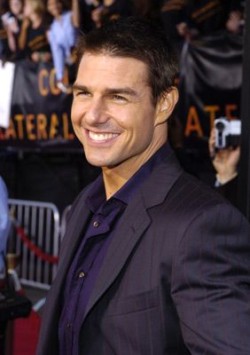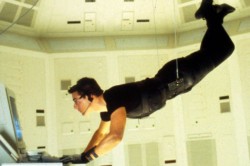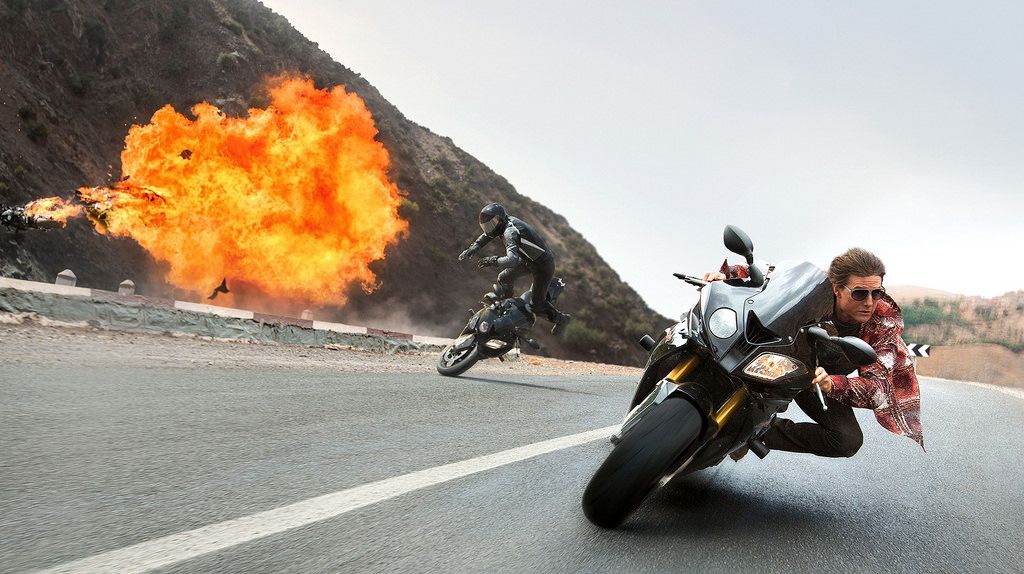The Top Gun of 20th century cinema: Why Tom Cruise is the best actor of this generation
The title of “Greatest Actor of the 20th Century” is a fiercely contested, multifaceted debate, fraught in particularly with the slew of news concerning the public lives of many actors, versus their onscreen talents. This might surprise you, but I would like to take the chance to establish my strongly-held, albeit wildly unpopular opinion that Tom Cruise is the greatest actor of the 20th century.
Before continuing into such an argument, it is important to emphasise the century of cinema concerned as the 20th, rather than that which succeeds it, as it’s fair to say that the actor in question has experienced a somewhat steep descent in credibility since his glory days in the 80s and 90s. Moreover, while I can already hear the angry cries of the abundance of hard-core cinema aficionados protesting their love for the talents of Marlon Brando and Laurence Olivier, I endeavour to present Cruise as a champion of inherently modern cinema, rather than attempting to justify a passion for WWII-era films and the immortalised stars of the silver screen.

Image credit: Wikimedia Commons
Growing up with aspirations for priesthood, Cruise began his unlikely career with a minor debut performance in Endless Love (1981) at the age of 19, and immediately caught the eyes of Hollywood producers looking for a young, charismatic actor with boyish charm; it wouldn’t be inaccurate to say that his discovery was the most successful thing about the film. Three similarly subordinate roles followed, and it wasn’t until his performance as Joel in Risky Business (1983) that Cruise proved his capabilities as a gifted leading man. His underpants-wearing, candlestick-toting character has become cinematic iconography for the western teenage boy, and the role proved to be a natural fit for Cruise, who, as a young man himself, relished the freedom that Joel’s character offered him. In an sit-down with Interview Magazine (1986), Cruise remarked “I’ve had such extremes in my life. From being this kind of wild kid, to one year studying to be a Franciscan priest at the seminary…I was very frustrated”, a testament to the suitability of his new-found career in its capacity for allowing him to channel his own experiences. While arguably not the most demanding of roles, Risky Business cemented Tom Cruise as a crowd-pleaser, an 80s heartthrob, and provided the platform upon which he would later truly flex his acting muscles.
His performance as Joel in Risky Business … his capabilities as a gifted leading man
Cruise is often criticised, and often disregarded within the aforementioned debate, for his roles as the one-dimensional action hero, beginning with his performance in Top Gun (1986) and later in Days of Thunder (1990) and Mission: Impossible (1996). But I’d like to enforce this suggestion as one contrary to the detriment of his ability as an actor. When it comes to this type of role, nobody did it – or does it – better than Tom Cruise. Mission: Impossible, in particular, paved the way for the performances of the Matt Damon’s and Daniel Craig’s of today, it’s failure to be considered the father of spy thrillers is merely a direct result of the pre-existence of the James Bond franchise. In the same way that Lethal Weapon defined the buddy cop genre by distilling the recognisable tropes that came before it, Mission: Impossible made a cohesive, fun and accessible spy movie from those that came before it, and earned its place in the mainstream. Cruise also brings an inescapable likeability and passion to these characters, who should otherwise elude our admiration due to their arrogance and thoroughly wooden personalities – he adds a magic to each and every character he embodies.
While Cruise has become synonymous with the running, flirting and fighting of his action men, it is his roles outside of these stereotypes that assure my opinions of his ability. In Rain Man (1988), Cruise excels in his depiction of self-centred yuppie Charlie Babbitt, a character with whom many consider he shared characteristics; a misconception perhaps drawn from his brilliance in portraying these archetypal individuals. His intensity and emotion steal every scene, in my opinion surpassing the similarly-dazzling performance of Dustin Hoffman, as he presented a character unknowingly embarking on a journey of self-discovery and moral development. The same is true of his portrayal of Jerry Maguire, in the film of the same name (1996), and of Frank Mackey in Magnolia (1999). These roles presented new challenges for Cruise, a far-cry from the ‘be yourself’ brief of Risky Business, and audiences saw an actor willing to wholeheartedly commit to delivering hybrid performances of humour, emotion, and a sincere love for his craft when portraying these fundamentally flawed individuals.
Cruise… brings an inescapable likeability and passion to these characters, who should otherwise elude our admiration due to their arrogance and thoroughly wooden personalities
Perhaps the most significant role of Cruise’s career was that of paralyzed veteran Ron Kovic in Born on the Fourth of July (1989), the film succeeding his star turn in Rain Man. His status amongst directors had become clear when he was outright preferred to Charlie Sheen, who had starred in Oliver Stone’s previous Vietnam blockbuster, proving Cruise’s talents extended beyond those of many of his contemporaries. Maybe here again, Cruise’s sheer likeability played a part in this, particularly in comparison to an actor like Sheen. The film represented the first in which Tom Cruise would method act; he lived in a wheelchair for weeks in preparation for the role, and even agreed to be temporarily paralysed (an action not approved by the studio’s insurance company) – disqualifying the ‘method actor’ argument proposed by fans of the likes of Daniel Day-Lewis and Leonardo DiCaprio. His portrayal of the simultaneously likeable, immature, angry, passionate Kovic earned Cruise his first Oscar nomination, and further entrenched the foundations for one of the most successful careers in Hollywood history.
The charm and intensity with which he graces the screen is replicated in his attitude when creating these films off-screen. “He has the best reputation in the industry, by far” screenwriter Ken Miyamoto wrote of Cruise on Quora, director Drew Goddard remarked in Entertainment Weekly “I’ve never met a more enthusiastic, creative, and supportive person”. Cruise’s ability as an actor has moulded the films he has been a part of; he improvises and digresses from the script because he has earned a license to do so. He does his own stunts (as evident by his recently-publicised ankle break), he lends his creative direction, and his films become as much his own as they are the directors.

Tom in the early days of the Mission: Impossible franchise. Image credit: Wikimedia Commons
The thorn in the side of Cruise, apart from the undeniably inappropriate public outbursts of his commitment to scientology, is that which hangs over the reputations of many great actors – the Academy Awards, or specifically lack thereof. Despite being nominated for three Oscars in the space of ten years, he has never been able to convince the Academy that any one of his performances have demonstrated a talent surpassing those of his contemporaries. This proves to be the most significant warning sign to those hesitant to consider Cruise as the greatest actor of the 20th century. However, it is important to note the Oscar-winning films he has been a part of. Rain Man, Born on the Fourth of July and Jerry Maguire share seven Academy Awards between them, with both Dustin Hoffman and Cuba Gooding Jr receiving best actor awards. This is no coincidence. Neither Hoffman nor Gooding Jr have replicated the performances they gave alongside Cruise, the recognition they received for the portrayal of their characters serves as a direct result of his influence upon his co-stars, and it looks likely that such an award will elude him despite the diversity, genius and artistry demonstrated throughout his acting career.
The thorn in the side of Cruise… is that which hangs over the reputations of many great actors – the Academy Awards, or specifically lack thereof.
Despite accomplished performances in Minority Report (2002), War of the Worlds (2005) and Valkyrie (2008), Cruise’s repertoire has somewhat declined in the last decade or so, calling into question his talent as an older actor. It remains to be seen whether he can rekindle the allure and integrity he once had, perhaps he is waiting for the right role. What is certain however, is the abundance of proposals being made to him, since Tom Cruise has become synonymous with financial success, a testament to his worldwide appeal – even if no longer critical appeal. Nevertheless, I stand by my belief that Tom Cruise is the greatest actor of the 20th century, and believe appreciation for the talent he once so effortlessly demonstrated is rarely recognised amongst the cinematic community. Never judge a book by its cover – or to paraphrase, never judge an actor by their religious beliefs, public image, or performance in The Mummy (2017).

Comments (4)
I quite agree!
In the end, Tom Cruise will always be the best actor no matter what. He’s even too good for an Oscar since that fake award only goes to the likes of Clooney, Gooding Jr. and Denzel Washington who don’t have the same intensity and drive like him. I prefer to spend my money on his movies because he’s extremely underrated and the critics can go to hell.
I agree! Their beliefs, as with every job, are separate from their work – it’s only with celebrities that we seem to care about their religions. As long as those beliefs don’t hurt anyone, it doesn’t have an impact on their work (and only begins to have an impact if they direct their work in such a way that it lets their opinions show though – which Cruise never does)
I enjoyed the article.I believe that if your disscussing someone’ work , their personal believes should not be considered.